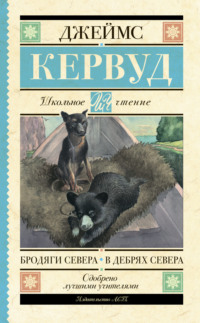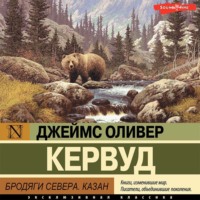 полная версия
полная версияThe Valley of Silent Men
This time he did not feel the clinging thrill of her little fingers and soft palm. Deep within him he experienced something that was like a sudden and unexpected blow. He was ready to fight for her until his last breath was gone. He was ready to believe anything she told him – anything except this impossible thing which she had just spoken. For she did know what had happened in Kedsty's room. She knew – unless —
Suddenly his heart leaped with joyous hope. "You mean – you were unconscious?" he cried in a low voice that trembled with his eagerness. "You fainted – and it happened then?"
She shook her head. "No. I was asleep in my room. I didn't intend to sleep, but – I did. Something awakened me. I thought I had been dreaming. But something kept pulling me, pulling me downstairs. And when I went, I found Kedsty like that. He was dead. I was paralyzed, standing there, when you came."
She drew her, hand away from him, gently, but significantly. "I know you can't believe me, Jeems. It is impossible for you to believe me."
"And you don't want me to believe you, Marette."
"Yes – I do. You must believe me."
"But the tress of hair – your hair – round Kedsty's neck – "
He stopped. His words, spoken gently as they were, seemed brutal to him. Yet he could not see that they affected her. She did not flinch. He saw no tremor of horror. Steadily she continued to look into the fire. And his brain grew confused. Never in all his experience had he seen such absolute and unaffected self-control. And somehow, it chilled him. It chilled him even as he wanted to reach out and gather her close in his arms, and pour his love into her ears, entreating her to tell him everything, to keep nothing back from him that might help in the fight he was going to make.
And then she said, "Jeems, if we should be caught by the Police – it would probably be quite soon, wouldn't it?"
"They won't catch us."
"But our greatest danger of being caught is right now, isn't it?" she insisted.
Kent took out his watch and leaned over to look at it in the fireglow. "It is three o'clock," he said. "Give me another day and night, Gray Goose, and the Police will never find us."
For a moment or two more she was silent. Then her hand reached out, and her fingers twined softly round his thumb again. "Jeems – when we are safe – when we are sure the Police won't find us – I will tell you all that I know – about what happened in Kedsty's room. And I will tell you – about – the hair. I will tell you – everything." Her fingers tightened almost fiercely. "Everything," she repeated. "I will tell you about that in Kedsty's room – and I will tell you about myself – and after that – I am afraid – you won't like me."
"I love you," he said, making no movement to touch her. "No matter what you tell me, Gray Goose, I shall love you."
She gave a little cry, scarcely more than a broken note in her throat, and Kent – had her face been turned toward him then – would have seen the glory that came into it, and into her eyes, like a swift flash of light – and passed as swiftly away.
What he did see, when she turned her head, were eyes caught suddenly by something at the cabin door. He looked. Water was trickling in slowly over the sill.
"I expected that," he said cheerfully. "Our scow is turning into a rain-barrel, Marette. Unless I bail out, we'll soon be flooded."
He reached for his slicker and put it on. "It won't take me long to throw the water overboard," he added. "And while I'm doing that I want you to take off your wet things and tuck yourself into bed. Will you, Gray Goose?"
"I'm not tired, but if you think it is best – " Her hand touched his arm.
"It is best," he said, and for a moment he bent over her until his lips touched her hair.
Then he seized a pail, and went out into the rain.
CHAPTER XX
It was that hour when, with clear skies, the gray northern dawn would have been breaking faintly over the eastern forests. Kent found the darkness more fog-like; about him was a grayer, ghostlier sort of gloom. But he could not see the water under his feet. Nor could he see the rail of the scow, or the river. From the stern, ten feet from the cabin door, the cabin itself was swallowed up and invisible.
With the steady, swinging motion of the riverman he began bailing. So regular became his movements that they ran in a sort of rhythmic accompaniment to his thoughts. The monotonous splash, splash, splash of the outflung pails of water assumed, after a few minutes, the character of a mechanical thing. He could smell the nearness of the shore. Even in the rain the tang of cedar and balsam came to him faintly.
But it was the river that impressed itself most upon his senses. It seemed to him, as the minutes passed, like a living thing. He could hear it gurgling and playing under the end of the scow. And with that sound there was another and more indescribable thing, the tremble of it, the pulse of it, the thrill of it in the impenetrable gloom, the life of it as it swept on in a slow and mighty flood between its wilderness walls. Kent had always said, "You can hear the river's heart beat – if you know how to listen for it." And he heard it now. He felt it. The rain could not beat it out, nor could the splash of the water he was throwing overboard drown it, and the darkness could not hide it from the vision that was burning like a living coal within him. Always it was the river that had given him consolation in times of loneliness. For him it had grown into a thing with a soul, a thing that personified hope, courage, comradeship, everything that was big and great in final achievement. And tonight – for he still thought of the darkness as night – the soul of it seemed whispering to him a sort of paean.
He could not lose. That was the thought that filled him. Never had his pulse beat with greater assurance, never had a more positive sense of the inevitable possessed him. It was inconceivable, he thought, even to fear the possibility of being taken by the Police. He was more than a man fighting for his freedom alone, more than an individual struggling for the right to exist. A thing vastly more priceless than either freedom or life, if they were to be accepted alone, waited for him in the little cabin, shut in by its sea of darkness. And ahead of them lay their world. He emphasized that. Their world – the world which, in an illusive and unreal sort of way, had been a part of his dreams all his life. In that world they would shut themselves in. No one would ever find them. And the glory of the sun and the stars and God's open country would be with them always.
Marette was the very heart of that reality which impinged itself upon him now. He did not worry about what it was she would tell him tomorrow, or day after tomorrow. He believed that it was then – when she had told him what there was to tell, and he still reached, out his arms to her – that she would come into those arms. And he knew that nothing that might have happened in Kedsty's room would keep his arms from reaching, to her. Such was his faith, potent as the mighty flood hidden in the gray-ghost gloom of approaching dawn.
Yet he did not expect to win easily. As he worked, his mind swept up and down the Three Rivers from the Landing to Fort Simpson, and mentally he pictured the situations that might arise, and how he would triumph over them. He figured that the men at Barracks would not enter Kedsty's bungalow until noon at the earliest. The Police gasoline launch would probably set out on a river search soon after. By mid-afternoon the scow would have a fifty-mile start.
Before darkness came again they would be through the Death Chute, where Follette and Ladouceur swam their mad race for the love of a girl. And not many miles below the Chute was a swampy country where he could hide the scow. Then they would start overland, west and north. Given until another sunset, and they would be safe. This was what he expected. But if it came to fighting – he would fight.
The rain had slackened to a thin drizzle by the time he finished his bailing. The aroma of cedar and balsam came to him more clearly, and he heard more distinctly the murmuring surge of the river. He tapped again at the door of the cabin, and Marette answered him.
The fire had burned down to a bed of glowing coals when he entered. Again he fell on his knees, and took off his dripping slicker.
The girl greeted him from the berth. "You look like a great bear, Jeems." There was a glad, welcoming note in her voice.
He laughed, and drew the stool beside her, and managed to sit on it, the roof compelling him to bend his head over a little. "I feel like an elephant in a birdcage," he replied. "Are you comfortable, little Gray Goose?"
"Yes. But you, Jeems? You are wet!"
"But so happy that I don't feel it, Gray Goose."
He could make her out only dimly there in the darkness of the berth. Her face was a pale shadow, and she had loosened her damp hair so that the warmth and dry air might reach it more easily. Kent wondered if she could hear the beating of his heart. He forgot the fire, and the darkness grew thicker. He could no longer see the pale outline of her face, and he drew back a little, possessed by the thought that it was sacrilegious to bend nearer to her, like a thief, in that gloom. She sensed his movement, and her hand reached to him and lay lightly with its fingertips touching his arm.
"Jeems," she said softly. "I'm not sorry – now – that I came up to Cardigan's place that day – when you thought you were dying. I wasn't wrong. You are different. And I made fun of you then, and laughed at you, because I knew that you were not going to die. Will you forgive me?"
He laughed happily. "It's funny how little things work out, sometimes," he said. "Wasn't a kingdom lost once upon a time because some fellow didn't have a horseshoe? Anyway, I knew of a man whose life was saved because of a broken pipe-stem. And you came to me, and I'm here with you now, because – "
"Of what?" she whispered.
"Because of something that happened a long time ago," he said. "Something you wouldn't dream could have anything to do with you or with me. Shall I tell you about it, Marette?"
Her fingers pressed slightly upon his arm. "Yes."
"Of course, it's a story of the Police," he began. "And I won't mention this fellow's name. You may think of him as that red-headed O'Connor, if you want to. But I don't say that it was he. He was a constable in the Service and had been away North looking up some Indians who were brewing an intoxicating liquor from roots. That was six years ago. And he caught something. Le Mort Rouge, we sometimes call it – the Red Death – or smallpox. And he was alone when the fever knocked him down, three hundred miles from anywhere. His Indian ran away at the first sign of it, and he had just time to get up his tent before he was flat on his back. I won't try to tell you of the days he went through. It was a living death. And he would have died, there is no doubt of it, if it hadn't been for a stranger who came along. He was a white man. Marette, it doesn't take a great deal of nerve to go up against a man with a gun, when you've got a gun of your own; and it doesn't take such a lot of nerve to go into battle when a thousand others are going with you. But it does take nerve to face what that stranger faced. And the sick man was nothing to him. He went into that tent and nursed the other back to life. Then the sickness got him, and for ten weeks those two were together, each fighting to save the other's life, and they won out. But the glory of it was with the stranger. He was going west. The constable was going south. They shook hands and parted."
Marette's fingers tightened on Kent's arm. And Kent went on.
"And the constable never forgot, Gray Goose. He wanted the day to come when he might repay. And the time came. It was years later, and it worked out in a curious way. A man was murdered. And the constable, who had become a sergeant now, had talked with the dead man only a little while before he was killed. Returning for something he had forgotten, it was the sergeant who found him dead. Very shortly afterward a man was arrested. There was blood on his clothing. The evidence was convincing, deadly. And this man – "
Kent paused, and in the darkness Marette's hand crept down his arm to his hand, and her fingers closed round it.
"Was the man you lied to save," she whispered.
"Yes. When the halfbreed's bullet got me, I thought it was a good chance to repay Sandy McTrigger for what he did for me in that tent years before. But it wasn't heroic. It wasn't even brave. I thought I was going to die and that I was risking nothing."
And then there came a soft, joyous little laugh from where her head lay on the pillow. "And all the time you were lying so splendidly, Jeems – I KNEW," she cried. "I knew that you didn't kill Barkley, and I knew that you weren't going to die, and I knew what happened in that tent ten years ago. And – Jeems – Jeems – "
She raised herself from the pillow. Her breath was coming a little excitedly. Both her hands, instead of one, were gripping his hand now. "I knew that you didn't kill John Barkley," she repeated. "And —Sandy McTrigger didn't kill him!"
"But – "
"He didn't," she interrupted him, almost fiercely. "He was innocent, as innocent as you were. Jeems – I Jeems – I know who killed Barkley. Oh, I know– I know!"
A choking sob came into her throat, and then she added, in a voice which she was straining to make calm, "Don't think that I haven't faith in you because I can't tell you more now, Jeems," she said. "You will understand – quite soon. When we are safe from the Police, I shall tell you. I shall keep nothing from you then. I shall tell you about Barkley, and Kedsty – everything. But I can't now. It won't be long. When you tell me we are safe, I shall believe you. And then – " She withdrew her hands from his and dropped back on her pillow.
"And then – what?" he asked, leaning far over.
"You may not like me, Jeems."
"I love you," he whispered. "Nothing in the world can stop my loving you."
"Even if I tell you – soon – that I killed Barkley?"
"No. You would be lying."
"Or – if I told you – that I – killed – Kedsty?"
"No matter what you said, or what proof there might be back there, I would not believe you."
She was silent. And then, "Jeems – "
"Yes, Niska, Little Goddess – ?"
"I'm going to tell you something – now!"
He waited.
"It is going to – shock you – Jeems."
He felt her arms reaching up. Her two hands touched his shoulders.
"Are you listening?"
"Yes, I am listening."
"Because I'm not going to say it very loud." And then she whispered, "Jeems —I love you!"
CHAPTER XXI
In the slowly breaking gloom of the cabin, with Marette's arms round his neck, her soft lips given him to kiss, Kent for many minutes was conscious of nothing but the thrill of his one great hope on earth come true. What he had prayed for was no longer a prayer, and what he had dreamed of was no longer a dream; yet for a space the reality of it seemed unreal. What he said in those first moments of his exaltation he would probably never remember.
His own physical existence seemed a thing trivial and almost lost, a thing submerged and swallowed up by the warm beat and throb of that other life, a thousand times more precious than his own, which he held in his arms. Yet with the mad thrill that possessed him, in the embrace of his arms, there was an infinite tenderness, a gentleness, that drew from Marette's lips a low, glad whispering of his name. She drew his head down and kissed him, and Kent fell upon his knees at her side and crushed his face close down to her – while outside the patter of rain on the roof had ceased, and the fog-like darkness was breaking with gray dawn.
In that dawn of the new day Kent came at last out of the cabin and looked upon a splendid world. In his breast was the glory of a thing new-born, and the world, like himself, was changed. Storm had passed. The gray river lay under his eyes. Shoreward he made out the dark outlines of the deep spruce and cedar and balsam forests. About him there was a great stillness, broken only by the murmur of the river and the ripple of water under the scow. Wind had gone with the black rainclouds, and Kent, as he looked about him, saw the swift dissolution of the last shadows of night, and the breaking in the East of a new paradise. In the East, as the minutes passed, there came a soft and luminous gray, and after that, swiftly, with the miracle of far Northern dawn, a vast, low-burning fire seemed to start far beyond the forests, tinting the sky with a delicate pink that crept higher and higher as Kent watched it. The river, all at once, came out of its last drifting haze of fog and night. The scow was about in the middle of the channel. Two hundred yards on either side were thick green walls of forest glistening fresh and cool with the wet of storm and breathing forth the perfume which Kent was drawing deep into his lungs.
In the cabin he heard sound. Marette was up, and he was eager to have her come out and stand with him in this glory of their first day. He watched the smoke of the fire he had built, hardwood smoke that drifted up white and clean into the rain-washed air.
The smell of it, like the smell of balsam and cedar, was to Kent the aroma of life. And then he began to clean out what was left of the water in the bottom of the scow, and as he worked he whistled. He wanted Marette to hear that whistle. He wanted her to know that day had brought with it no doubt for him. A great and glorious world was about them and ahead of them. And they were safe.
As he worked, his mind became more than ever set upon the resolution to take no chances. He paused in his whistling for a moment to laugh softly and exultantly as he thought of the years of experience which were his surest safeguard now. He had become almost uncannily expert in all the finesse and trickery of his craft of hunting human game, and he knew what the man-hunters would do and what they would not do. He had them checkmated at the start. And, besides – with Kedsty, O'Connor, and himself gone – the Landing was short-handed just at present. There was an enormous satisfaction in that. But even with a score of men behind him Kent knew that he would beat them. His hazard, if there was peril at all, lay in this first day. Only the Police gasoline launch could possibly overtake them. And with the start they had, he was sure they would pass the Death Chute, conceal the scow, and take to the untracked forests north and west before the launch could menace them. After that he would keep always west and north, deeper and deeper into that wild and untraveled country which would be the last place in which the Law would seek for them. He straightened himself and looked at the smoke again, drifting like gray-white lace between him and the blue of the sky, and in that moment the sun capped the tall green tops of the highest cedars, and day broke gloriously over the earth.
For a quarter of an hour longer Kent mopped at the floor of the scow, and then – with a suddenness that drew him up as if a whip-lash had snapped behind him – he caught another aroma in the clean, forest-scented air. It was bacon and coffee! He had believed that Marette was taking her time in putting on dry footwear and making some sort of morning toilet. Instead of that, she was getting breakfast. It was not an extraordinary thing to do. To fry bacon and make coffee was not, in any sense, a remarkable achievement. But at the present moment it was the crowning touch to Kent's paradise. She was getting HIS breakfast! And – coffee and bacon – To Kent those two things had always stood for home. They were intimate and companionable. Where there were coffee and bacon, he had known children who laughed, women who sang, and men with happy, welcoming faces. They were home-builders.
"Whenever you smell coffee and bacon at a cabin," O'Connor had always said, "they'll ask you in to breakfast if you knock at the door."
But Kent was not recalling his old trail mate's words. In the present moment all other thoughts were lost in the discovery that Marette was getting breakfast – for him.
He went to the door and listened. Then he opened it and looked in. Marette was on her knees before the open door of the stove, toasting bread on two forks. Her face was flushed pink. She had not taken time to brush her hair, but had woven it carelessly into a thick braid that fell down her back. She gave a little exclamation of mock disappointment when she saw Kent.
"Why didn't you wait?" she remonstrated. "I wanted to surprise you."
"You have," he said. "And I couldn't wait. I had to come in and help."
He was inside the door and on his knees beside her. As he reached for the two forks, his lips pressed against her hair. The pink deepened in Marette's face, and the soft little note that was like laughter came into her throat. Her hand caressed his cheek as she rose to her feet, and Kent laughed back. And after that, as she arranged things on the shelf table, her hand now and then touched his shoulder, or his hair, and two or three times he heard that wonderful little throat-note that sent through him a wild pulse of happiness. And then, he sitting in the low chair and she on the stool, they drew close together before the board that answered as a table, and ate their breakfast. Marette poured his coffee and stirred sugar and condensed milk in it, and so happy was Kent that he did not tell her he used neither milk nor sugar in his coffee. The morning sun burst through the little window, and through the open door Kent pointed to the glory of it on the river and in the shimmering green of the forests slipping away behind. When they had finished, Marette went outside with him.
For a space she stood silent and without movement, looking upon the marvelous world that encompassed them. It seemed to Kent that for a few moments she did not breathe. With her head thrown back and her white throat bare to the soft, balsam-laden air she faced the forests. Her eyes became suddenly filled with the luminous glow of stars. Her face reflected the radiance of the rising sun, and Kent, looking at her, knew that he had never seen her so beautiful as in these wonderful moments. He held his own breath, for he also knew that Niska, his goddess, was looking upon her own world again after a long time away.
Her world – and his. Different from all the other worlds God had ever made; different, even, from the world only a few miles behind them at the Landing. For here was no sound or whisper of destroying human life. They were in the embrace of the Great North, and it was drawing them closer, and with each minute nearer to the mighty, pulsing heart of it.
The forests hung heavy and green and glistening with the wet of storm; out of them came the tremulous breath of life and the glory of living; they hugged the shores like watchful hosts guarding the river from civilization – and suddenly the girl held out her arms, and Kent heard the low, thrilling cry that came to her lips.
She had forgotten him. She had forgotten everything but the river, the forests, and the untrod worlds beyond them, and he was glad. For this world that she was welcoming, that her soul was crying out to, was his world, for ever and ever. It held his dreams, his hopes, all the desires that he had in life. And when at last Marette turned toward him slowly, his arms were reaching out to her, and in his face she saw that same glory which filled her own.
"I'm glad – glad," she cried softly. "Oh, Jeems – I'm glad!"
She came into his arms without hesitation; her hands stroked his face; and then she stood with her head against his shoulder, looking ahead, breathing deeply now of the sweet, clear air filled with the elixir of the hovering forests. She did not speak, or move, and Kent remained quiet. The scow drifted around a bend. Shoreward a great moose splashed up out of the water, and they could hear him afterward, crashing through the forest. Her body tensed, but she did not speak. After a little he heard her whisper,
"It has been a long time, Jeems. I have been away four years."
"And now we are going home, little Gray Goose. You will not be lonely?"
"No. I was lonely down there. There were so many people, and so many things, that I was homesick for the woods and mountains. I believe I would have died soon. There were only two things I loved, Jeems – "









